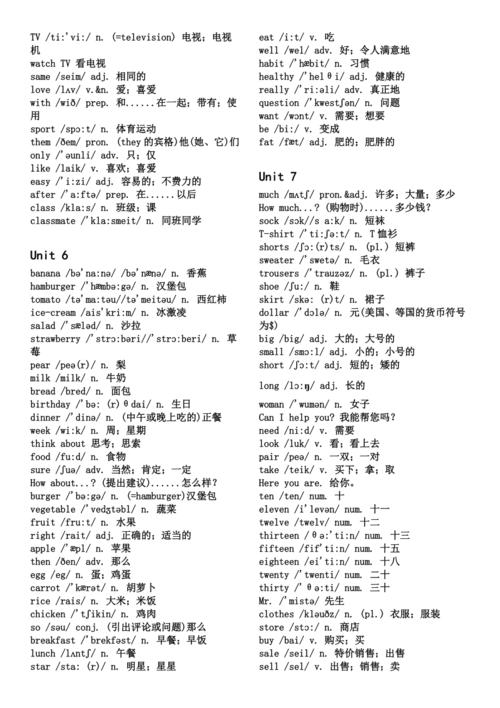babyoverall,overall怎么读
问题一、初一上册英语单词表
第五组50张像.准备图像,比如.看起来像来了.六见面.vt;见面;遇见家人.n;家庭爸爸.n(口语)爸爸;父亲母亲.妈妈.母亲;儿子.nSon兄弟.哥哥,弟弟,女儿.n女儿姐姐,姐姐戒指.铃响了.vi去你好吗.你(健康)怎么样?很好.下午好,你好.你好坐.请坐.坐下.向下的朋友.朋友的床.卧室.十面墙.墙壁风筝.n比特窗口.窗户灯.nLamp表.可移植的花.橄榄球.足球有些有些;一些人发现.寻找扫帚.扫帚瓷器.中国字母.让我们.我们马上转弯.依次为n;轮到你了现在轮到你了.现在颜色.红色.红色黑色.黑白的.白色蓝色.蓝色橙色.橙色第六组50个绿色.绿色的.黄棕色的.棕色的借口.原谅我.pron I哪个.adjpron哪一个;哪一个.pron(用来代替单数的人或事物)Mrs.毛衣夫人.n运动衫;颜色.毛衣.vt彩色地雷.穿上我的衣服.晾衣绳.n线;绳罩衫.衬衫.衬衫裙子.连衣裙.n连衣裙;(统称)衣服裤子.裤子先生.教师鞋(用于姓名前).谁的鞋子.谁是你的.pron你的;你必须.v.aux必须,应该感谢.及物动词感谢她的.让她穿上.穿上我们的.在我们的和他们的.pron他们(他们;他们)时间.时间表.手表给.vt到.准备;就从.从.准备.从.从.到.敬十三.十三十五号.数字15820.数字221.数字2130.数字340.num。Y.数字580.数字800.num百忘.忘记点钟.大约十点钟.去学校去教室去教室玩.vi玩;打(球)50场比赛的第七组.n游戏;回家.回家去睡觉.睡眠娃娃.旧洋娃娃.老照片.年轻的照片.年轻的;幼小的婴儿.猜猜看.我猜很快.我现在在一年级。

问题二、英语单词构词法
英语构词法(1)前缀1。表文件中带否定意义的前缀1)纯否定前缀a-,an-,非对称(非对称)无水(无水)不诚实,不喜爱in-,ig-,il,im,ir,无能力,不可能,不光彩,不可能,不可变,非法,不规则ne-,n-,none,next,neveron-,noessen neg-,否定非不可能,失业2)表示错误的意思男性-,mal-,故障,失调misake,误导伪-,伪-(假名),伪自信3)表示解除,防御,拆除dis-,解除,断开un-,卸载,un
ntra-, contre-, contro-, contradiction, controflow(逆流)counter-, counterreaction, counterbalanceob-, oc-, of-, op-, object, oppose, occupywith-, withdraw, withstand2. 表示空间位置,方向关系的前缀1)a- 表示“在……之上”,“向……”aboard, aside,2)by- 表示“附近,邻近,边侧”bypath, bypass(弯路)3)circum-, circu-, 表示“周围,环绕,回转”circumstance, circuit4)de-, 表示“在下,向下”descend, degrade5)en-, 表示“在内,进入”encage, enbed(上床)6)ex-, ec-, es-, 表示“外部,外”exit, eclipse, expand, export7)extra-, 表示“额外”extraction {提取}8)fore- 表示“在前面”forehead, foreground9)in-, il-, im-, ir-, 表示“向内,在内,背于”inland, invade, inside, import10)inter-, intel-, 表示“在……间,相互”international, interaction, internet11)intro-, 表示“向内,在内,内侧”introce, introce12)medi-, med-, mid-, 表示“中,中间”Mediterranean, midposition13)out-, 表示“在上面,在外部,在外”outline, outside, outward14)over-, 表示“在上面,在外部,向上”overlook, overhead, overboard15)post-, 表示”向后,在后边,次”postscript(附言),16)pre-, 表示”在前”在前面”prefix, preface, preposition17)pro-, 表示“在前,向前”progress, proceed,18)sub-, suc-, suf-, sug-, sum-, sup-, sur-, sus-, 表示“在下面,下”subway, submarine, suffix, suppress, supplement19)super-, sur-, 表示“在…..之上”superficial, surface, superstructure20)trans-, 表示“移上老蠢搏,转上,在那一边”translate, transform, transoceanic21)under-, 表示“在…..下面,下的”underline, underground, underwater22)up-, 表示“向上,向上面,在上”upward, uphold, uphill(上坡)3. 表示时间,序列关系的侍祥前缀1)ante-, anti-, 表示“先前,早于,预先”antecedent, anticipate,2)ex-, 表示“先,故,旧”expresident, exhusband3)fore-, 表示“在前面,先前,前面”foreward, dorecast, foretell(预言)4)mid-, medi-, 表示“中,中间”midnight, midsummer5)post-“表示“在后,后”postwar,6)pre-, pri-, 表示“在前,事先,预先”preheat, prewar, prehistory7)pro-, 表示“在前,先,前”prologue(序幕),prophet(预言家)8)re-, 表示“再一次,重新”retell, rewrite4. 表示比较程度差别关系的前缀1)by-, 表示“副,次要的”byproct, bywork(副业)2)extra-,表示“超越,额外”extraordinary,3)hyper- 表示“超过,极度”hypersonic(超声波), hypertesion(高血压)4)out-,表示“超过,过分”outdo(超过), outbid(出价过高的人)5)over-,表示“超过,过度,太”overeat, overdress, oversleep6) sub-, suc-, sur-, ??表示“低,次,副,亚”subeditor, subordinate, subtropical(亚热带)7)super-, sur- 表示“超过”supernature, superpower, surplus, surpass8)under-,表示“低劣,低下”undersize, undergrown, underproction(生产不足)9)vice- 表示“副,次”vicepresident, vicechairman5. 表示共同,相等意思的前缀1)com-, cop-, con-, cor-, co- 表示“共同,一起”。connect, combine, collect, combat, coexist, co-operate2)syn-, syl-,sym-,表示“同,共,和,类”symmetry, sympathy, synthesis(合成)6. 表示整个完全意思的前缀1)al- 表示“完整,完全”alone, almost,2) over-表示“完全,全”overall, overflow(充满)3) pan-表示“全,总,万”panentheism(泛神论),panorama7. 表示分离,离开意思的前缀1)a- ab-, abs-,表示“分离,离开” away, apart, abstract, abstain2)de- 表示“离去,处去”depart, decolour,3)dis-, di-, dif-, 表示“分离,离开” divorce, disarm(缴械)4)ex-, e-, 表示“离开,分离”expel, exclude, expatriate(驱出国外)5)for- 表示“离开,脱离”forget, forgive6)表示“离开”release, resolve7)表示“分离,隔离”separate, sece, select8. 表示通过,遍及意思的前缀1)dia-,表示“通过,横过”diameter, diagram,2)per-, pel-, 表示“通,总,遍”perfect, perform, pervade(浸透)3)trans-, 表示“横过,贯通”transparent, transmit, transport9. 表示加强意思的前缀a-, arouse, ashamedad-, adjoin, adhere( 粘着)10. 表示变换词类作用的前缀be-, befriend,en-, enslave, enable, enrichad-, ac-, af-, ag-, an-, ap-, ar-, as-, at-, adapt, accord, affix, aggression, arrive, assist, attend, attract, arrange, assign(委派)11. 表示数量关系的前缀1)表示“单一”,“一”mon-, mon-, monotone(单调),monopoly, monarchuni-, un-, uniform, unicellular(单细胞)2)表示“二,两,双”ambi-, ambiguous, amphibian(两栖类)bi-, bin- bicycle, di-, diode(二级管),twi-, twilight3)表示“十”deca, deco-, dec- deci-, decade, decimals4)表示”百,百分子一”?hecto-, hect-, hectometer,centi-, centimeter5)表示”千,千分子一” kilo-, kilometer6)表示”万,万分子一”myria-, myri-, myriametremega-, meg-, megabytemicro-, microvolt (微伏特)7)表示”许多,复,多数”multi-, mult-, multipmetre (万用表)poly-, polysyllable,8)表示“半,一半”hemi-, hemispheredemi-, demiofficialsemi-, semiconctor, semitransparentpene-, pen-, peninsula12. 表示特殊意义的前缀1)arch-, 表示“首位,第一的,主要的”architect, archbishop2)auto-, 表示“自己,独立,自动”automobile, autobiography3)bene-, 表示“善,福”benefit4)eu-, 表示“优,美好”eugenics(优生学),euphemism5)male-, mal- 表示“恶,不良”maltreatment, malodor,6)macro-, 表示“大,宏大”macroscopic(宏观)7)magni-, 表示“大”magnificent8)micro-, 表示“微”microscope13. 表示术语的前缀1)aud-, 表示“听,声”audience,2)bio-, 表示“生命,生物”biography(传记)3)ge-, 表示“地球,大地”geography4)phon-, 表示“声,音调”phonograph5)tele-, 表示“远离”television, telephone
相关问题三、举例英语的前缀,后缀,(中文意思)并给出单词
一.常见的前缀 1.表示否定意义的前缀 1)纯否定前缀 a-, an-, asymmetry{不对称}anhydrous{无水的} dis- dishonest, dislike in-, ig-, il, im, ir, incapable, inability, ignoble, impossible, immoral, illegal, irregular ne-, n-, none, neither, never non-, noesense neg-, neglect un- unable, unemployment 2)表示错误的意义 male-, mal-, malfunction, maladjustment(失调) mis-, mistake, mislead pseudo-, pseudonym(假名), pseudoscience 3)表示反动作的意思 de-, defend, demolation(解调) dis-, disarm, disconnect un-, unload, uncover 4)表示相反,相互对立意思 anti-, ant- antiknock( 防震), antforeign,(排外的) contra-, contre-, contro-, contradiction, countercurrent (逆流) counter-, counterreaction, counterbalance ob-, oc-, of-, op-, object, oppose, occupy with-, withdraw, withstand 2. 表示空间位置,吵举方向关系的前缀 1)a- 表示“在……升码碧之上”,“向……” aboard, aside, 2)by- 表示“附近,邻近,边侧” bypath, bypass(弯路) 3)circum-, circu-, 表示“周围,环绕,回转” circumstance, circuit 4)de-, 表示“在下,向下” descend, degrade 5)en-, 表示“在内,进入” encage, enbed(上床) 6)ex-, ec-, es-, 表示“外部,外” exit, eclipse, expand, export 7)extra-, 表示“额外” extraction {提取} 8)fore- 表示模尘“在前面” forehead, foreground 9)in-, il-, im-, ir-, 表示“向内,在内,背于” inland, invade, inside, import 10)inter-, intel-, 表示“在……间,相互” international, interaction, internet 11)intro-, 表示“向内,在内,内侧” introce, introce 12)medi-, med-, mid-, 表示“中,中间” Mediterranean, midposition 13)out-, 表示“在上面,在外部,在外” outline, outside, outward 14)over-, 表示“在上面,在外部,向上” overlook, overhead, overboard 15)post-, 表示”向后,在后边,次” postscript(附言), 16)pre-, 表示”在前”在前面” prefix, preface, preposition 17)pro-, 表示“在前,向前” progress, proceed, 18)sub-, suc-, suf-, sug-, sum-, sup-, sur-, sus-, 表示“在下面,下” subway, submarine, suffix, suppress, supplement 19)super-, sur-, 表示“在…..之上” superficial, surface, superstructure 20)trans-, 表示“移上,转上,在那一边” translate, transform, transoceanic 21)under-, 表示“在…..下面,下的” underline, underground, underwater 22)up-, 表示“向上,向上面,在上” upward, uphold, uphill(上坡) 3. 表示时间,序列关系的前缀 1)ante-, anti-, 表示“先前,早于,预先” antecedent, anticipate, 2)ex-, 表示“先,故,旧” expresident, exhusband 3)fore-, 表示“在前面,先前,前面” foreward, dorecast, foretell(预言) 4)mid-, medi-, 表示“中,中间” midnight, midsummer 5)post-“表示“在后,后” postwar, 6)pre-, pri-, 表示“在前,事先,预先” preheat, prewar, prehistory 7)pro-, 表示“在前,先,前” prologue(序幕),prophet(预言家) 8)re-, 表示“再一次,重新” retell, rewrite 4. 表示比较程度差别关系的前缀 1)by-, 表示“副,次要的” byproct, bywork(副业) 2)extra-,表示“超越,额外” extraordinary, 3)hyper- 表示“超过,极度” hypersonic(超声波), hypertesion(高血压) 4)out-,表示“超过,过分” outdo(超过), outbid(出价过高的人) 5)over-,表示“超过,过度,太” overeat, overdress, oversleep 6) sub-, suc-, sur-, 表示“低,次,副,亚” subeditor, subordinate, subtropical(亚热带) 7)super-, sur- 表示“超过” supernature, superpower, surplus, surpass 8)under-,表示“低劣,低下” undersize, undergrown, underproction(生产不足) 9)vice- 表示“副,次” vicepresident, vicechairman 5. 表示共同,相等意思的前缀 1)com-, cop-, con-, cor-, co- 表示“共同,一起”。 connect, combine, collect, combat, coexist, co-operate 2)syn-, syl-,sym-,表示“同,共,和,类” symmetry, sympathy, synthesis(合成) 6. 表示整个完全意思的前缀 1)al- 表示“完整,完全”alone, almost, 2) over-表示“完全,全”overall, overflow(充满) 3) pan-表示“全,总,万”panentheism(泛神论),panorama 7. 表示分离,离开意思的前缀 1)a- ab-, abs-,表示“分离,离开” away, apart, abstract, abstain 2)de- 表示“离去,处去”depart, decolour, 3)dis-, di-, dif-, 表示“分离,离开” divorce, disarm(缴械) 4)ex-, e-, 表示“离开,分离”expel, exclude, expatriate(驱出国外) 5)for- 表示“离开,脱离”forget, forgive 6)表示“离开”release, resolve 7)表示“分离,隔离”separate, sece, select 8. 表示通过,遍及意思的前缀 1)dia-,表示“通过,横过”diameter, diagram, 2)per-, pel-, 表示“通,总,遍”perfect, perform, pervade(浸透) 3)trans-, 表示“横过,贯通”transparent, transmit, transport 9. 表示加强意思的前缀 a-, arouse, ashamed ad-, adjoin, adhere( 粘着) 10. 表示变换词类作用的前缀 be-, befriend, en-, enslave, enable, enrich ad-, ac-, af-, ag-, an-, ap-, ar-, as-, at-, adapt, accord, affix, aggression, arrive, assist, attend, attract, arrange, assign(委派) 11. 表示数量关系的前缀 1)表示“单一”,“一” mon-, mon-, monotone(单调),monopoly, monarch uni-, un-, uniform, unicellular(单细胞) 2)表示“二,两,双” ambi-, ambiguous, amphibian(两栖类) bi-, bin- bicycle, di-, diode(二级管), twi-, twilight 3)表示“十”deca, deco-, dec- deci-, decade, decimals 4)表示”百,百分之一” hecto-, hect-, hectometer, centi-, centimeter 5)表示”千,千分子一” kilo-, kilometer 6)表示”万,万分子一” myria-, myri-, myriametre mega-, meg-, megabyte micro-, microvolt (微伏特) 7)表示”许多,复,多数” multi-, mult-, multipmetre (万用表) poly-, polysyllable, 8)表示“半,一半” hemi-, hemisphere demi-, demiofficial semi-, semiconctor, semitransparent pene-, pen-, peninsula 12. 表示特殊意义的前缀 1)arch-, 表示“首位,第一的,主要的”architect, archbishop 2)auto-, 表示“自己,独立,自动”automobile, autobiography 3)bene-, 表示“善,福”benefit 4)eu-, 表示“优,美好”eugenics(优生学),euphemism 5)male-, mal- 表示“恶,不良”maltreatment, malodor, 6)macro-, 表示“大,宏大”macroscopic(宏观) 7)magni-, 表示“大”magnificent 8)micro-, 表示“微”microscope 13. 表示术语的前缀 1)aud-, 表示“听,声”audience, 2)bio-, 表示“生命,生物”biography(传记) 3)ge-, 表示“地球,大地”geography 4)phon-, 表示“声,音调”phonograph 5)tele-, 表示“远离”television, telephone 二.常见的后缀 1. 名词后缀 (1) 具有某种职业或动作的人 1)-an, -ain, 表示”……地方的人,精通……的人”American, historian, 2)-al, 表示”具有……职务的人” principal, 3)-ant,-ent, 表示”……者” merchant, agent, servant, student, 4)-ar, 表示”……的人” scholar, liar, peddler 5)-ard, -art, 表示”做……的人”coward, laggard, braggart(夸张者) 6)-arian, 表示”……派别的人, ……主义的人”humanitarian, vegetarian 7)-ary, 表示”从事……的人” secretary, missionary 8)-ant, 表示”具有……职责的人” candidate, graate 9)-ator, 表示”做……的人” ecator, speculator(投机者) 10)-crat, 表示”某种政体,主义的支持者” democrat, bureaucrat 11)-ee, 表示”动作承受者” employee, examinee 12)-eer, 表示”从事于……人” engineer, volunteer 13)-er, 表示”从事某种职业的人, 某地区,地方的人” banker, observer, Londoner, villager 14)-ese, 表示” ……国人,…..地方的人”Japanese, Cantonese 15)-ess, 表示”阴性人称名词, actress, hostess, manageress 16)-eur, 表示”……家” amateur, littérateur 17)-ian, 表示”……地方人,信仰…….教的人,从事……职业的人”Christian, physician(内科医生),musician 18)-ician, 表示”精通者, ……家,”electrician, magician, technician 19)-icist, 表示”……家, …….者, …….能手”physicist, phoneticist, technicist 20)-ic, 表示”……者,……师” mechanic, critic 21)-ie, 表示”爱,指小” dearie, auntie, lassie(小姑娘) 22)-ier, 表示”从事……职业” cavalier, clothier, brazier(黄铜匠) 23)-ine, ian, 表示”阴性人称” heroine, ballerina 24)-ist, 表示”从事……研究者,信仰……主义者” pianist, communist, dentist, artist, chemist 25)-ive, 表示”动作者,行为者” native, captive 26)-logist, 表示”……学家,研究者” biologist, geologist(地质学家) 27)-or, 表示”……者” author, doctor, operator, 28)-ster, 表示”做…….事情的人”youngster, gamester(赌徒),songster 29)-yer, 表示” 从事……职业者” lawyer (2). 构成,具有抽象名词的含义 1)-acy, 表示”性质,状态,境遇” accuracy, diplomacy 2)-age, 表示”状态,行为,身份及其结果,总称” courage, storage, marriage 3)-al, a) 表示”事物的动作,过程”refusal, arrival, survival, denial, approval b) 表示具体的事物manual, signal, editorial, journal 4)-ance, -ence表示”性质,状况,行为,过程,总量,程度” enrance, importance, diligence, difference, obedience 5)-ancy, -ency, 表示”性质,状态,行为,过程” frequency, urgency, efficiency, 6)-bility, 表示”动作,性质,状态” possibility, feasibility, 7)-craft, 表示”工艺,技巧” woodcraft, handicraft, statecraft{治国策} 8)-cracy, 表示”统治,支配” bureaucracy, democracy 9)-cy, 表示”性质,状态,职位,级别” bankruptcy(破产),supremacy 10)-dom, 表示”等级,领域,状态” freedom, kingdom, wisdom 11)-ery, -ry, 表示”行为,状态,习性” bravery, bribery, rivalry 12)-ety, 表示”性质,状态” variety, biety(怀疑) 13)-faction, -facture, 表示”作成,……化,作用” satisfaction, manufacture 14)-hood, 表示”资格,身份, 年纪,状态” childhood, manhood, falsehood 15)-ice, 表示”行为,性质,状态” notice, justice, service 16)-ine, 表示”带有抽象概念” medicine, discipline, famine 17)-ing, 表示”动作的过程,结果” building, writing, learning 18)-ion, -sion, -tion, -ation, -ition, 表示”行为的过程,结果,状况” action, solution, conclusion, destruction, expression, correction 19)-ise, 表示”性质,状态” exercise, merchandise(商业) 20)-ism, 表示”制度,主义,学说,信仰,行为” socialism, criticism, colloquialism, heroism 21)-ity, 表示”性质,状态,程度” purity, reality, ability, calamity 22)-ment, 表示”行为,状态,过程,手段及其结果 treatment, movement, judgment, punishment, argument 23)-mony, 表示”动作的结果,状态” ceremony, testimony 24)-ness, 表示”性质,状态,程度” goodness, kindness, tiredness, friendliness 25)-or, -our, 表示”动作,性质,状态” favor, error, 26)-osity, 表示”动作,状态” curiosity 27)-ship, 表示”情况,性质,技巧,技能及身份,职业” hardship, membership, friendship 28)-th, 表示”动作,性质,过程,状态” depth, wealth, truth, length, growth 29)-tude, 表示”性质,状态,程度” latitude, altitude(海拔) 30)-ure, 表示”行为,结果” exposure, pressure, failure, procere(手续), 31)-y, 表示”行为的结果,状态,性质” glory, history, victory, inquiry (3) 带有场所,地方的含义 1)-age, 表示”住所,地点” village, cottage 2)-ary, 表示”住所,场地” library, granary (谷仓) 3)-ery, ry, 表示”工作场所,饲养所,地点” laundry, nursery, surgery(手术室) 4)-ory, 表示”工作场所,住处” factory, dormitory, laboratory, observatory (4) 带有学术,科技含义 1)-grapy, 表示”……学,写法” biography, calligraphy, geography 2)-ic, ics, 表示”……学……法” logic, mechanics, optics, electronics 3)-ology, 表示”……学……论”biology, zoology, technology(工艺学) 4)-nomy, 表示”……学……术” astronomy, economy, bionomy(生态学) 5)-ery, 表示”学科,技术” chemistry, cookery, machinery 6)-y, 表示”……学,术,法” photography, philosophy (5) 表示人和事物的总和,集合含义 1)-age, baggage, tonnage 2)-dom, newspaperdom(新闻界) 3)-hood, neighbourhood, womanhood 4)-ery, cavalry, ministry(内阁) 5)-ure, legislature, judicature (6) 表示物品和物质名称的含义 1)-ant, ent, solvent, constant 2)-al, signal, pictorial(画报) 3)ar, collar, pillar(石柱) 4)- er, boiler, computer, washer, cooker 5)-ery, drapery(绸缎) 6)-ing, clothing, matting, 7)-ment, instrument, equipment, attachment (7) 表示“细小”的含义 1)-cle, particle, 2)-cule, molecule(分子) 3)-el, parcel 4)-en, chicken, maiden 5)-et, pocket, ticket 6)-etta, -ette, etto, cigarette, essayette(短文) 7)-kin, napkin 8)-ling, ckling, 9)-let, booklet 10)-y, baby, doggy 2. 形容词后缀 {1}带有“属性,倾向,相关”的含义 1)-able, -ible, movable, comfortable, applicable, visible, responsible 2)-al, natural, additional, ecational 3)-an, ane, urban, suburban, republican 4)-ant, -ent, distant, important, excellent 5)-ar, similar, popular, regular 6)-ary, military, voluntary 7)-ice, -atie, ical, politic, systematic, historic, physical, 8)-ine, masculine, feminine, marine 9)-ing, moving, touching, daring 10)-ish, foolish, bookish, selfish 11)-ive, active, impressive, decisive 12)-ory, satisfactory, compulsory 13)-il, -ile, -eel, fragile, genteel(文雅的) (2) 表示“相象,类似”的含义 1)-ish, boyish, childish 2)-esque, picturesque 3)-like, manlike, childlike 4)-ly, manly, fatherly, scholarly, motherly 5)-some, troublesome, handsome 6)-y, milky, pasty (3) 表示“充分的”含义 1)-ful, beautiful, wonderful, helpful, truthful 2)-ous, dangerous, generous, courageous, various 3)-ent, violent, (4) 表示由某种物质形成,制成或生产的含义 1)-en, wooden, golden, woolen 2)-ous, gaseous 3)-fic, scientific (5) 表示方向的含义 1)-ern, eastern, western 2)-ward, downward, forward (6) 表示“倍数”的含义 1)-ble, double, treble 2)ple, triple 3)-fold, twofold, tenfold (7) 表示“数量关系”的含义 1)-teen, thirteen 2)-ty, fifty 3)-th, fourth, fiftieth (8) 表示国籍,语种,宗教的含义 1)-an, Roman, European 2)-ese, Chinese, 3)-ish, English, Spanish (9) 表示“比较程度”的含义 1)-er, greater 2)-ish, reddish, yellowish 3)-est, highest 4)-most, foremost, topmost (10)其他的含义 -less, 表示否定,countless, stainless, wireless 3. 动词后缀 1)-ize, ise, 表示”做成,变成,……化“modernize, mechanize, democratize, organize 2)-en, 表示”使成为,引起,使有” quicken, weaken, soften, harden 3)-fy, 表示”使……化, 使成”beautify, purify, intensify, signify, simplify 4)-ish, 表示”使,令” finish, abolish, diminish, establish 5)-ate, 表示“成为……,处理,作用” separate, operate, indicate 4. 副词后缀 1)-ly, possibly, swiftly, simply 2)-ward, -wards, downward, inwards, upward 3)-ways, always, sideways 4)-wise, otherwise, clockwise 三.常见的词根 常见的词根 1) aer, ar, 含义是“空气,大气” aeroplane, aerial, 2) ag, act, ig, 含义是“做,动作” active, agent, reaction, 3) alt, 含义是“高”, altitude, 4) alter, altern, altr, 含义是“其它,变更” alternate, 5) bio, bi, bion, 含义是“生物,生命” biology, bionics(仿生学) 6) brev, bri, brief, 含义是“短” brief, abbreviation, abridge(节略) 7) cap, capt, cept, cip, 含义是“取,获” capture, except, concept, capacity 8) ced, ceed, cess, 含义是“行,让步” proceed, succeed, excess(过度) 9) centr, centr, 含义是“中心” concentrate, eccentric(偏心的) 10) clain, clam, 含义是“呼喊” claim, proclaim, exclaim 11) clos, clud, 含义是“闭合” conclude, enclose, include 12) col, cult, 含义是“耕耘” colony, cultivate, agriculture 13) cor, cord, 含义是“心” cordial, record, accord 14) curr, cur, cour, 含义是“跑,动作” current, occur, concurrence(同时发生) 15) dic, dict, 含义是“说,示” dictate, edit, indicate, predict 16) doc, doct, 含义是“教” doctor, document 17) c, ct含义是“引导,传导” introce, proce, conct, dect( 推论) 18) fact, fac, fect, dic, dit, 含义是“做,创造” factory, effect, profit, faculty, perfect 19) fend, fens, 含义是“打,击” defence, offence 20) fer, 含义是“搬运,移转” ferry, transfer, defer(迟延) 21) fin, finit, 含义是“终,极” final, finish, confine 22) firm, 含义是“坚固” firm, confirm, affirm(断定) 23) fix, 含义是“固定” prefix, affix(附加) 24) flect, flex, 含义是“弯曲” flexible, reflex 25) flor, flour, flower, 含义是“花” flower, flourish 26) form, 含义是“形” uniform, formula, transform, reform, deform 27) forc, fort, 含义是“力,强度” force, enforce, effort 28) gen, genit, 含义是“生产,发生” generate, generation 29) gram, graph, 含义是“书写,记录” telegram, diagram, photograph 30) grad, gress, gred, gree, 含义是“步,阶段” graally, degree, progress 31) hab, habit, hibit, 含义是“保持,住” inhabit, exhibit, prohibit 32) her, hes, 含义是“粘附” adhere, cohesion 33) ject, jet, 含义是“抛射” project, inject 34) jour, 含义是“日,一天” journal(日记), journey, adjourn(延期) 35) jug, junct, 含义是“结合,连合” conjunction, junction(连合) 36) labour, labor, 含义是“劳动,工作” labourer, elaborate, collaborate 37) lect, leg, lig, 含义是“挑选,采集” collect, select, lecture 38) lif, liv, 含义是“生活,生存” life, alive, live 39) loc, 含义是“场所,位置” location, dislocate(脱位) 40) long, leng, ling, 含义是“长的” length, prolong, linger 41) loqu, locut, 含义是“说话” colloquial, eloquent, 42) mand, mend, 含义是“命令” command, demand, recommend 43) man, manu, 含义是“手,手法” manage, manual 44) memor, menber, 含义是“记忆” memory, remember, memorial 45) mind, ment, 含义是“心” mind, remind, mental 46) merc, merch, 含义是“贸易” commerce, merchant 47) meas, mens, meter, metr, 含义是“测量,度量” measure, meter, diameter 48) min, 含义是“小” diminish, minority 49) miss, mit, 含义是“派遣,送” mission, dismiss, transmit, missile 50) mob, mot, mov, 含义是“动” movement, motion, mobile, remove 51) nect, nex, 含义是“捆扎” connect, disconnect, annex(合并) 52) not, 含义是“记号,注意” note, denote, annotation(注释) 53) onom, onym, 含义是“名字” synonym, antonym, anonymous 54) pair, par, 含义是“a)相同,对等b)准备” compare, prepare 55) pel, puls, 含义是“追逐” expel, impel(推进) 56) pend, pens, pond, 含义是“悬挂” depend, independent, expense(支付) 57) phon, 含义是“声音” symphony, telephone, microphone 58) plac, 含义是“位置,场所” place, replace 59) peopl, popul, publ, 含义是“人民,民众” public, republic, popular, people 60) port, 含义是“搬运” export, import, deport(输送) 61) press, 含义是“压,压制” pressure, express, oppress, impression 62) prob, proof, prov, 含义是“实验,验证” prove, approve, 63) quer, quest, quir, quis, 含义是“寻找,探问” inquiry, question, inquisition(调查,追究) 64) rang, rank, 含义是“排列” arrange, rank, 65) rect, right, rig, 含义是“正,直” correct, direct, erect 66) riv, 含义是“河流,流远”,river, arrive, derive 67) rupt, 含义是“破坏,毁坏” eruption, bankrupt, corruption 68) sci, 含义是“认识,知识” science, conscious 69) scrib, script, 含义是“书写,记录” describe, script 70) sens, sent, 含义是“感觉,情感” sensation, sentiment 71) sign, 含义是“标记,符号” signal, signature, design 72) sembl, simil, 含义是“相似,类似” similar, resemble, assimilate(同化) 73) soci, 含义是“结合,社交” social, association 74) spec, spect, spitc, spis, 含义是“看,视” inspect, spectator, conspicuous, respect 75) struct, 含义是“建筑,构造” structure, construct, instruct, destruction 76) tect, teg, 含义是“遮蔽,掩盖” detect, protect 77) temp, tens, 含义是“时间,时机” tense, contemporary, temporal 78) tend, tes, tent, 含义是“倾向, 伸张” tendency, intension, extend, intend 79) test, 含义是“证明,证实” testify, protest, contest(争论) 80) text, 含义是“编织, 构成” textile, texture, context 81) tract, trail, 含义是“拖拉,吸引” attract, tractor, abstract, contract(收缩) 82) tribut, 含义是“给予” contribution, distribute 83) us, ut, 含义是“用,使用” usable, utilize, abuse 84) vac, van, 含义是“空,虚” vacancy, vanity, evacuate(清空) 85) vad, vas, wad, 含义是“走,去” invade, wade, evade(逃避) 86) vers, vert, 含义是“旋转,反转” convert, inversion(倒转), reverse, divert(使转向) 87) vid, vis, vey, view, 含义是“观看,看见” television, visible, evident, interview, survey 88) viv, vit, 含义是“生,活” vivid, vital, survival, 89) war, ward, 含义是“注意,保护” aware, wary(谨慎), ward(守护) 90) way, 含义是“路” way, away, subway, always !
你可能关注的问题四、请帮忙罗列写有否定前缀的英文单词,越多越好,谢谢!
aperiodic、anisotropic、dishonest、insensitive、nonage1、aperiodic adj. 不定期的;非周期性的短语aperiodic dampong 非周期阻尼 ; 过阻尼aperiodic task 非周期任务aperiodic variation 非周期性变化aperiodic instrument 不摆式仪表aperiodic discharge 非周期放电aperiodic group [数] 非周期群aperiodic disturbance 非周期性扰动 ; 非周期扰动aperiodic regeneration 非周期性再和 ; [电颂野子] 非周期性再生aperiodic input 非周期输入例句:Thirdly, the schele strategy of the aperiodic task of NCS is studied. 随后,讨论了网络化控制系统非周期性任务的调度策略。2、anisotropic adj. [物] 各向异性的;[物] 非均质的短语Anisotropic Steel 各向异性钢片anisotropic consolidation 各向不等压固结 ; 各向异性固结 ; 异向性压密 ; 不等性压密anisotropic formation 各向异性地层anisotropic filter 方向滤波器 ; 各向异性过滤 ; 各向异性扩散滤波anisotropic fluid 蛤异性铃anisotropic chromosphore 各向异性色团anisotropic soil 异向性土壤 ; 各向异性土 ; 性土壤Anisotropic Field 各向异性场anisotropic mat 各向异性材料板 ; 各向异性的材料板例句:Anisotropic filtering level of the texture. 纹理的各向异性过滤等级。3、dishonest adj. 不诚实的;欺诈的短语Dishonest deceptive 不诚实的Dishonest Scales 诡诈天平dishonest advertising 挂羊头Dishonest Trader 奸商Except dishonest 除了不诚实的人外dishonest methods 指不正当的门路 ; 不正当的手段 ; 手段等例句:It would be dishonest to mislead people and not to present the data as fairly as possible.误导人们、不尽可能公正地提供数据是不诚实的。4、insensitive adj. {对他人的感受}未意识到的,漠不关心的;{对变化}懵然不知的,麻木不仁的;{对肆雹某事物}无感觉,无反应短语How Insensitive 如此迟钝 ; 如此冷漠 ; 冷漠无情 ; 如此敏感insensitive to 迟钝 ; 对insensitive nature 感觉迟钝的天性make insensitive 使意识不到insensitive ammunition 钝感弹药insensitive action 钝感作用insensitive factor 不敏感系数Contamination insensitive 对环境不敏感androgen insensitive 雄激素不敏感例句:I feel my husband is very insensitive about my problem.我感到丈夫对我的问题麻木不仁。5、nonage n. 未成年;早期;幼稚;青年时期,未成熟短语nonage e 未成年nonage bedside 早期床边nonage student 未成年学生nonage criminals 未成年犯Speed Nonage 小齐舞冠军nonage person 未成年人nonage reading 早期阅读Nonage United 未野雹喊成年同盟会nonage students 未成年学生例句:The conclusion provides primary bases for forest nonage selection. 这一结论可为林木早期选择提供初步依据。
推荐问题五、英语单词后缀,前缀有哪些
一. 常见的前缀 1.表示否定意义的前缀 1)纯否定前缀 a-, an-, asymmetry{不对称}anhydrous{无水的} dis- dishonest, dislike in-, ig-, il, im, ir, incapable, inability, ignoble, impossible, immoral, illegal, irregular ne-, n-, none, neither, never non-, noesense neg-, neglect un- unable, unemployment 2)表示错误的意义 male-, mal-, malfunction, maladjustment(失调) mis-, mistake, mislead pseudo-, pseudonym(假名), pseudoscience 3)表示反动作的意思 de-, defend, demolation(解调) dis-, disarm, disconnect un-, unload, uncover 4)表示相反,相互对立意思 anti-, ant- antiknock( 防震), antiforeign,(排外的) contra-, contre-, contro-, contradiction, controflow(逆流) counter-, counterreaction, counterbalance ob-, oc-, of-, op-, object, oppose, occupy with-, withdraw, withstand 2. 表示空间位置,方向关系宽孙的前缀 1)a- 表示“在……之上”,“向……” aboard, aside, 2)by- 表示“附近,慎渗链邻近,边侧” bypath, bypass(弯路) 3)circum-, circu-, 表示“周围,环绕,回转” circumstance, circuit 4)de-, 表示“在下,向下” descend, degrade 5)en-, 表示“在内,进入” encage, enbed(上床) 6)ex-, ec-, es-, 表示“外部,外” exit, eclipse, expand, export 7)extra-, 表示“额外” extraction {提取} 8)fore- 表示“在前面” forehead, foreground 9)in-, il-, im-, ir-, 表示“向内,在内,背于” inland, invade, inside, import 10)inter-, intel-, 表示“在……间,相互” international, interaction, internet 11)intro-, 表示“向喊州内,在内,内侧” introce, introce 12)medi-, med-, mid-, 表示“中,中间” Mediterranean, midposition 13)out-, 表示“在上面,在外部,在外” outline, outside, outward 14)over-, 表示“在上面,在外部,向上” overlook, overhead, overboard 15)post-, 表示”向后,在后边,次” postscript(附言), 16)pre-, 表示”在前”在前面” prefix, preface, preposition 17)pro-, 表示“在前,向前” progress, proceed, 18)sub-, suc-, suf-, sug-, sum-, sup-, sur-, sus-, 表示“在下面,下” subway, submarine, suffix, suppress, supplement 19)super-, sur-, 表示“在…..之上” superficial, surface, superstructure 20)trans-, 表示“移上,转上,在那一边” translate, transform, transoceanic 21)under-, 表示“在…..下面,下的” underline, underground, underwater 22)up-, 表示“向上,向上面,在上” upward, uphold, uphill(上坡) 3. 表示时间,序列关系的前缀 1)ante-, anti-, 表示“先前,早于,预先” antecedent, anticipate, 2)ex-, 表示“先,故,旧” expresident, exhusband 3)fore-, 表示“在前面,先前,前面” foreward, dorecast, foretell(预言) 4)mid-, medi-, 表示“中,中间” midnight, midsummer 5)post-“表示“在后,后” postwar, 6)pre-, pri-, 表示“在前,事先,预先” preheat, prewar, prehistory 7)pro-, 表示“在前,先,前” prologue(序幕),prophet(预言家) 8)re-, 表示“再一次,重新” retell, rewrite 4. 表示比较程度差别关系的前缀 1)by-, 表示“副,次要的” byproct, bywork(副业) 2)extra-,表示“超越,额外” extraordinary, 3)hyper- 表示“超过,极度” hypersonic(超声波), hypertesion(高血压) 4)out-,表示“超过,过分” outdo(超过), outbid(出价过高的人) 5)over-,表示“超过,过度,太” overeat, overdress, oversleep 6) sub-, suc-, sur-, 表示“低,次,副,亚” subeditor, subordinate, subtropical(亚热带) 7)super-, sur- 表示“超过” supernature, superpower, surplus, surpass 8)under-,表示“低劣,低下” undersize, undergrown, underproction(生产不足) 9)vice- 表示“副,次” vicepresident, vicechairman 5. 表示共同,相等意思的前缀 1)com-, cop-, con-, cor-, co- 表示“共同,一起”。 connect, combine, collect, combat, coexist, co-operate 2)syn-, syl-,sym-,表示“同,共,和,类” symmetry, sympathy, synthesis(合成) 6. 表示整个完全意思的前缀 1)al- 表示“完整,完全”alone, almost, 2) over-表示“完全,全”overall, overflow(充满) 3) pan-表示“全,总,万”panentheism(泛神论),panorama 7. 表示分离,离开意思的前缀 1)a- ab-, abs-,表示“分离,离开” away, apart, abstract, abstain 2)de- 表示“离去,处去”depart, decolour, 3)dis-, di-, dif-, 表示“分离,离开” divorce, disarm(缴械) 4)ex-, e-, 表示“离开,分离”expel, exclude, expatriate(驱出国外) 5)for- 表示“离开,脱离”forget, forgive 6)表示“离开”release, resolve 7)表示“分离,隔离”separate, sece, select 8. 表示通过,遍及意思的前缀 1)dia-,表示“通过,横过”diameter, diagram, 2)per-, pel-, 表示“通,总,遍”perfect, perform, pervade(浸透) 3)trans-, 表示“横过,贯通”transparent, transmit, transport 9. 表示加强意思的前缀 a-, arouse, ashamed ad-, adjoin, adhere( 粘着) 10. 表示变换词类作用的前缀 be-, befriend, en-, enslave, enable, enrich ad-, ac-, af-, ag-, an-, ap-, ar-, as-, at-, adapt, accord, affix, aggression, arrive, assist, attend, attract, arrange, assign(委派) 11. 表示数量关系的前缀 1)表示“单一”,“一” mon-, mon-, monotone(单调),monopoly, monarch uni-, un-, uniform, unicellular(单细胞) 2)表示“二,两,双” ambi-, ambiguous, amphibian(两栖类) bi-, bin- bicycle, di-, diode(二级管), twi-, twilight 3)表示“十”deca, deco-, dec- deci-, decade, decimals 4)表示”百,百分子一” hecto-, hect-, hectometer, centi-, centimeter 5)表示”千,千分子一” kilo-, kilometer 6)表示”万,万分子一” myria-, myri-, myriametre mega-, meg-, megabyte micro-, microvolt (微伏特) 7)表示”许多,复,多数” multi-, mult-, multipmetre (万用表) poly-, polysyllable, 8)表示“半,一半” hemi-, hemisphere demi-, demiofficial semi-, semiconctor, semitransparent pene-, pen-, peninsula 12. 表示特殊意义的前缀 1)arch-, 表示“首位,第一的,主要的”architect, archbishop 2)auto-, 表示“自己,独立,自动”automobile, autobiography 3)bene-, 表示“善,福”benefit 4)eu-, 表示“优,美好”eugenics(优生学),euphemism 5)male-, mal- 表示“恶,不良”maltreatment, malodor, 6)macro-, 表示“大,宏大”macroscopic(宏观) 7)magni-, 表示“大”magnificent 8)micro-, 表示“微”microscope 13. 表示术语的前缀 1)aud-, 表示“听,声”audience, 2)bio-, 表示“生命,生物”biography(传记) 3)ge-, 表示“地球,大地”geography 4)phon-, 表示“声,音调”phonograph 5)tele-, 表示“远离”television, telephone 二. 常见的后缀 1. 名词后缀 (1) 具有某种职业或动作的人 1)-an, -ain, 表示”……地方的人,精通……的人”American, historian, 2)-al, 表示”具有……职务的人” principal, 3)-ant,-ent, 表示”……者” merchant, agent, servant, student, 4)-ar, 表示”……的人” scholar, liar, peddler 5)-ard, -art, 表示”做……的人”coward, laggard, braggart(夸张者) 6)-arian, 表示”……派别的人, ……主义的人”humanitarian, vegetarian 7)-ary, 表示”从事……的人” secretary, missionary 8)-ant, 表示”具有……职责的人” candidate, graate 9)-ator, 表示”做……的人” ecator, speculator(投机者) 10)-crat, 表示”某种政体,主义的支持者” democrat, bureaucrat 11)-ee, 表示”动作承受者” employee, examinee 12)-eer, 表示”从事于……人” engineer, volunteer 13)-er, 表示”从事某种职业的人, 某地区,地方的人” banker, observer, Londoner, villager 14)-ese, 表示” ……国人,…..地方的人”Japanese, Cantonese 15)-ess, 表示”阴性人称名词, actress, hostess, manageress 16)-eur, 表示”……家” amateur, littérateur 17)-ian, 表示”……地方人,信仰…….教的人,从事……职业的人”Christian, physician(内科医生),musician 18)-ician, 表示”精通者, ……家,”electrician, magician, technician 19)-icist, 表示”……家, …….者, …….能手”physicist, phoneticist, technicist 20)-ic, 表示”……者,……师” mechanic, critic 21)-ie, 表示”爱,指小” dearie, auntie, lassie(小姑娘) 22)-ier, 表示”从事……职业” cavalier, clothier, brazier(黄铜匠) 23)-ine, ian, 表示”阴性人称” heroine, ballerina 24)-ist, 表示”从事……研究者,信仰……主义者” pianist, communist, dentist, artist, chemist 25)-ive, 表示”动作者,行为者” native, captive 26)-logist, 表示”……学家,研究者” biologist, geologist(地质学家) 27)-or, 表示”……者” author, doctor, operator, 28)-ster, 表示”做…….事情的人”youngster, gamester(赌徒),songster 29)-yer, 表示” 从事……职业者” lawyer (2). 构成,具有抽象名词的含义 1)-acy, 表示”性质,状态,境遇” accuracy, diplomacy 2)-age, 表示”状态,行为,身份及其结果,总称” courage, storage, marriage 3)-al, a) 表示”事物的动作,过程”refusal, arrival, survival, denial, approval b) 表示具体的事物manual, signal, editorial, journal 4)-ance, -ence表示”性质,状况,行为,过程,总量,程度” enrance, importance, diligence, difference, obedience 5)-ancy, -ency, 表示”性质,状态,行为,过程” frequency, urgency, efficiency, 6)-bility, 表示”动作,性质,状态” possibility, feasibility, 7)-craft, 表示”工艺,技巧” woodcraft, handicraft, statecraft{治国策} 8)-cracy, 表示”统治,支配” bureaucracy, democracy 9)-cy, 表示”性质,状态,职位,级别” bankruptcy(破产),supremacy 10)-dom, 表示”等级,领域,状态” freedom, kingdom, wisdom 11)-ery, -ry, 表示”行为,状态,习性” bravery, bribery, rivalry 12)-ety, 表示”性质,状态” variety, biety(怀疑) 13)-faction, -facture, 表示”作成,……化,作用” satisfaction, manufacture 14)-hood, 表示”资格,身份, 年纪,状态” childhood, manhood, falsehood 15)-ice, 表示”行为,性质,状态” notice, justice, service 16)-ine, 表示”带有抽象概念” medicine, discipline, famine 17)-ing, 表示”动作的过程,结果” building, writing, learning 18)-ion, -sion, -tion, -ation, -ition, 表示”行为的过程,结果,状况” action, solution, conclusion, destruction, expression, correction 19)-ise, 表示”性质,状态” exercise, merchandise(商业) 20)-ism, 表示”制度,主义,学说,信仰,行为” socialism, criticism, colloquialism, heroism 21)-ity, 表示”性质,状态,程度” purity, reality, ability, calamity 22)-ment, 表示”行为,状态,过程,手段及其结果 treatment, movement, judgment, punishment, argument 23)-mony, 表示”动作的结果,状态” ceremony, testimony 24)-ness, 表示”性质,状态,程度” goodness, kindness, tiredness, friendliness 25)-or, -our, 表示”动作,性质,状态” favor, error, 26)-osity, 表示”动作,状态” curiosity 27)-ship, 表示”情况,性质,技巧,技能及身份,职业” hardship, membership, friendship 28)-th, 表示”动作,性质,过程,状态” depth, wealth, truth, length, growth 29)-tude, 表示”性质,状态,程度” latitude, altitude(海拔) 30)-ure, 表示”行为,结果” exposure, pressure, failure, procere(手续), 31)-y, 表示”行为的结果,状态,性质” glory, history, victory, inquiry (3) 带有场所,地方的含义 1)-age, 表示”住所,地点” village, cottage 2)-ary, 表示”住所,场地” library, granary (谷仓) 3)-ery, ry, 表示”工作场所,饲养所,地点” laundry, nursery, surgery(手术室) 4)-ory, 表示”工作场所,住处” factory, dormitory, laboratory, observatory (4) 带有学术,科技含义 1)-grapy, 表示”……学,写法” biography, calligraphy, geography 2)-ic, ics, 表示”……学……法” logic, mechanics, optics, electronics 3)-ology, 表示”……学……论”biology, zoology, technology(工艺学) 4)-nomy, 表示”……学……术” astronomy, economy, bionomy(生态学) 5)-ery, 表示”学科,技术” chemistry, cookery, machinery 6)-y, 表示”……学,术,法” photography, philosophy (5) 表示人和事物的总和,集合含义 1)-age, baggage, tonnage 2)-dom, newspaperdom(新闻界) 3)-hood, neighbourhood, womanhood 4)-ery, cavalry, ministry(内阁) 5)-ure, legislature, judicature (6) 表示物品和物质名称的含义 1)-ant, ent, solvent, constant 2)-al, signal, pictorial(画报) 3)ar, collar, pillar(石柱) 4)- er, boiler, computer, washer, cooker 5)-ery, drapery(绸缎) 6)-ing, clothing, matting, 7)-ment, instrument, equipment, attachment (7) 表示“细小”的含义 1)-cle, particle, 2)-cule, molecule(分子) 3)-el, parcel 4)-en, chicken, maiden 5)-et, pocket, ticket 6)-etta, -ette, etto, cigarette, essayette(短文) 7)-kin, napkin 8)-ling, ckling, 9)-let, booklet 10)-y, baby, doggy 2. 形容词后缀 {1}带有“属性,倾向,相关”的含义 1)-able, -ible, movable, comfortable, applicable, visible, responsible 2)-al, natural, additional, ecational 3)-an, ane, urban, suburban, republican 4)-ant, -ent, distant, important, excellent 5)-ar, similar, popular, regular 6)-ary, military, voluntary 7)-ice, -atie, ical, politic, systematic, historic, physical, 8)-ine, masculine, feminine, marine 9)-ing, moving, touching, daring 10)-ish, foolish, bookish, selfish 11)-ive, active, impressive, decisive 12)-ory, satisfactory, compulsory 13)-il, -ile, -eel, fragile, genteel(文雅的) (2) 表示“相象,类似”的含义 1)-ish, boyish, childish 2)-esque, picturesque 3)-like, manlike, childlike 4)-ly, manly, fatherly, scholarly, motherly 5)-some, troublesome, handsome 6)-y, milky, pasty (3) 表示“充分的”含义 1)-ful, beautiful, wonderful, helpful, truthful 2)-ous, dangerous, generous, courageous, various 3)-ent, violent, (4) 表示由某种物质形成,制成或生产的含义 1)-en, wooden, golden, woolen 2)-ous, gaseous 3)-fic, scientific (5) 表示方向的含义 1)-ern, eastern, western 2)-ward, downward, forward (6) 表示“倍数”的含义 1)-ble, double, treble 2)ple, triple 3)-fold, twofold, tenfold (7) 表示“数量关系”的含义 1)-teen, thirteen 2)-ty, fifty 3)-th, fourth, fiftieth (8) 表示国籍,语种,宗教的含义 1)-an, Roman, European 2)-ese, Chinese, 3)-ish, English, Spanish (9) 表示“比较程度”的含义 1)-er, greater 2)-ish, reddish, yellowish 3)-est, highest 4)-most, foremost, topmost (10)其他的含义 -less, 表示否定,countless, stainless, wireless 3. 动词后缀 1)-ize, ise, 表示”做成,变成,……化“modernize, mechanize, democratize, organize 2)-en, 表示”使成为,引起,使有” quicken, weaken, soften, harden 3)-fy, 表示”使……化, 使成”beautify, purify, intensify, signify, simplify 4)-ish, 表示”使,令” finish, abolish, diminish, establish 5)-ate, 表示“成为……,处理,作用” separate, operate, indicate 4. 副词后缀 1)-ly, possibly, swiftly, simply 2)-ward, -wards, downward, inwards, upward 3)-ways, always, sideways 4)-wise, otherwise, clockwis
六、英式英语和美式英语的差异
英式英语和美式英语的发展和差异摘要 英语现在已经发展成一个在全球范围内使用最广泛的语言。英语作为英美文化信息的载体和表现形式,深深地烙团卜中上了英美独有的文化印记。本文从英式英语和美式英语两种语言在音、形、意三个方面语言的差异追溯其变化原因。通过比较英弊掘式英语和美式英语的差异,可以看出社会文化因素对语言的产生和流传有决定作用,并且通过分析英语的这两大变体,折射了英美的政治经济、社会生活、国家历史、地域文化、各自的文化特异现象等等。由于英语本身具有词汇量大、包容性大、表达简洁的特点,英语语言的发展趋势将向着共同语与多样化并存的方向发展。关键词:英式英语、美式英语、变化原因;发展趋势 On the Difference and Development of British English and American English ABSTRACT Nowadays English has been developing into a global language. As a message carrier, English fully reflects the unique cultures possessed by the British and American countries. The first part of this paper investigates the differences between the British English and its American counterpart from politics, economy, social life, culture, and geography. Then the underlying causes of the differences are exposed in the second part through which the role cultures have played in shaping as well as circulating a language is highlighted. All in all, since English is characterized by its huge vocabulary, great tolerance, and conciseness, it leaves little room for argument that English will be well on its way to be a diversified common language. Key words: British English; American English; cause of change; tendency目前,世界上讲英语的有四亿多人,但作为第一语言,使用人数最多,地域最广的要属是美国和英国。英语的形成,发展及使用范围也不尽相同。英语正在成为一种全球性语言。美国英语承传着英国英语的基本要素,十七世纪在美洲大陆得到了进一步丰富和发展。由于美国本身、社会和生活的独特性,因此就形成了今天英式英语{British English}和美式英语{American English}。本文将就语言的发展变化、变化原因、以及语言发展趋势进行阐述。通过研究,我们从英式英语和美式英语的差异,可以看出社会文化因素对语言的产生和流传有决定作用,通过以上对语言发展的原因和特色的分析,我们可以认识到一些英美文化的特征,而认识和了解这些特征无疑能帮助我们更准确地理解英国和美国,而对英式英语和美式英语的这两大变体的研究也让我们对语言特别是英语语言的发展有了充分的认识。 一、语言的变化 “语言总是随着社会的发展和人们生活方塌山式的改变而不断变化。”[1]{16}语言在很多方面发生变化,比如在词汇、语音、语法以及语义等方面。英语语言的发展可概括为三方面:“1.英语自身的发展,尽管美国仍沿用英语中的一些旧用法,但英语在英国本土得到了很大的发展。2.美国的独立发展,美国在吸收词汇的基础上,同时使自身得到了发展。3.两种语言的相互影响。它大致可以分为三个阶段:从十七世纪到美国独立战争结束,英国英语占主导地位;从独立战争结束到美国内战,美国已渐渐独立发展起来,尽管英语仍占统治地位;从内战到现在,尤其是第一次世界大战,美国开始影响英语,同时替代了英语中的一些词汇鉴于以上三方面的原因,英美语言出现一些差异是不足为奇的。”[2]{3} {一}、语音 美式英语和英式英语在语音方面的一些不同是显而易见的。这么一则笑话:一位英国人和美国人在火车站不期而遇。美国人性格开朗,善于结交朋友,说了几句客套话后就问:“What’s your job?”。英国人回答说“I’m a clerk. ”美国人听了十分惊讶:“ Clock? Your job is to tick tick all day long? ”同一个词,美国人念〔klεrk〕,而英国人读〔cla:k〕。以上这则笑话就反映了英美两国在语音方面的不同。 英国英语和美国英语发音的差异,表现在某些单词的发音上,没有一定的规律可循。常见读音差异的单词有: 例词 BE AE ate 〔et 〕 〔eit 〕 been 〔bi:n 〕 〔bin 〕 idyll 〔ˊidil〕 〔ˊaidl〕 z 〔zed 〕 〔zi 〕 其次,两国在词重音的处理上也不尽相同且差异较大。重音的差别在英语单词中,只要是两个以上的音节,其中一个音节总要带重音。在多音节单词中,通常有两个重音。 BE使用者习惯把单词的主重音放在诸音节靠后的音节上,而AE使用者则喜爱把主重音放在前面的音节上。在许多以-ary,-ory结尾的单词和以-ate结尾的双音节词中,BE把主重音放在第二个音节上,而AE则把重音放在第一音节上。例如: BE AE anˊcillary ˊancillary laˊboratory ˊlaboratory coˊrollary ˊcorollary dicˊtate ˊdictate miˊgrate ˊmigrate 通常情况下,BE 的次重音出现在主重音的前面,而AE的次重音出现在主重音的后面,特别是复合词。例如: BE AE farmˊhouse ˊfarmhouse iceˊcream ˊicecream 尽管英式英语和美式英语在发音上有些许不同,但是我们仍然可以很容易的对其进行区分,这也并不会造成我们学习的困难。 {二}、词汇 英式英语和美式英语虽同出一源,但在以后的发展中受到的影响不同就产生了拼写上的不同。“英语基本词汇系统是英国英语和美国英语的共同词汇核心。离开这样一个核心,无论是美国英语还是英国英语都将不复存在。[3](3) 1、同词异义:相同词既出现在美国英语中,也出现在英国英语中,但分别表示完全不同的概念。例如: 例词 BE AE biscuit 苏打饼干 软饼 billion 万亿 十亿 overall 紧身裤 工装裤 2、同义异词:英国英语和美国英语分别用不同的词来表示同一概念。举例来说: BE AE 词义 lift elevator 电梯 tin can 罐头 tap faucet 水龙头 sweets candy 糖果 3、拼写差异:英式英语和美式英语虽属于同一体系,但两国在拼写体系仍略有不同。举例如下: BE AE 词义 ardour ardor 热情 dialogue dialog 对话 aeon eon 永世 aesthetic esthetic 审美的 analyse analyze 分析 inflexion inflection 弯曲 sceptic skeptic 怀疑论者 mommy mummy 妈妈 尽管这两种英语在词汇的拼写、词义有所不同,但他们并不是两种语言,而是一种语言在不同地区的变体。总之,通过分析可以进一步了解两种语言的特点,丰富关于英语语言的知识,提高英语应用能力。 {三}、语法 英语和美语除了发音、拼写和词汇上存在差异外,在语法上也存在差异。对英式英语、美式英语语法上的差异进行分析对英语学习大有裨益。以下我举几个英式英语和美式英语在习惯上用法不同的例子。 {1}名词: 除上文讨论的词尾变化不同外。美国英语将其他词类名词化的倾向比英国英语更为明显,特别是那些带介词的短语动词:to cook out →a cook-out ;to know how →the know-how; to run down →the rundown; to be shut in →a shut-in; to stop over →the stopover等。 集合名词做主语时,英国英语的谓语动词可以是单数形式或者复数形式,美国英语几乎总是用单数形式。例如:BE :They are a family who has been very influential in the history of this country. AE/BE: The committee has decided to look into the matter further.名词作定语时,美国英语多用单数形式,而英国英语则常用其复数形式。例如:BE:The worker decided to form a new trades union. AE: The worker decided to form a new trade union. {2}动词 have ,get, make 当动词have有致使之意时,美国用have;英国对上级用get,对下级用make.英语中的to have 是个词性不明确的动词。英国人既把它用作助动词又把它用作实义动词;美国人则一律将它当作实义动词来用。例如: BE: I will get someone come. AE: I will have someone come. {3}形容词: 在美国英语中,形容词的比较可以跟在all the 之后,表示强调。而英国英语则使用any 加形容词比较级这一形式来表示强调。例如: BE: Can’t you do any better than that? AE: Is that all the better you can do? {4}过去时与现在完成时: 表示距现在不远的过去所发生或完成的事情,英国英语常用现在完成时,则美国英语则倾向于使用一般过去时。例如: BE:I have studied your report already. AE:I studied your report already. BE:Now I know what it is! I’ve forgotten its name. AE:Now I know what it is! I forgot its name. 英国英语和美国英语在语法方面的差异不太多。两国英语具有共同的语法体系,在语法上的一些细微差别正在逐渐地为对方所容纳,模仿乃至同化。只是某些语法形式在两国英语中使用的频率有所不同。然而我们要与英美人交流就必须采用他们相应的习惯用法。 二、语言变化的原因 “萧伯纳有过一句妙语:英美两国之间存在着一条共同语言的鸿沟。” [4] {4}事实上,任何一种语言的发展变化都是一个复杂的过程,它不仅反映了一个民族或国家的文化变迁,也是历史传统、政治、经济发展的反映。语言总是随着社会的发展和人们生活方式的改变而不断变化。英语是当代国际交往中使用最广的语言,同时又是处于急速变化之中的语言。其来源有很多,“首先,科技的发展是其主要提供源。第二,动荡的政治局面和日新月异的社会环境也是其来源。第三,社会的变革冲击着人们意识形态,也给语言的发展造成很大影响,产生了相应的语言。”[5](2) {一}、政治经济 政治事件,政治人物、政治运动、政治团体、政治政策都可能导致语言的变化。有时,语言会发生剧烈的变化,尤其是在社会政治变革的时候。 在美国,2001年9月11日恐怖份子对美国纽约世贸大厦的袭击,这一事件导致许多新词的产生。其中Ground Zero用以指恐怖袭击后世贸大厦所留下的废墟。“9.11”也具有了特别的意义,特指那时的恐怖袭击。甚至Osamaniac一词也出现在媒体之中,这个词用来指代疯狂爱慕奥萨马•本•拉登的女性。 而在英国,托尼.布莱尔当选英国首相后,我们就看到一些新词出现了:Blairism,Blairist,Blairistas,Blairification,Blairite等。Watergate(水门事件)一词是由政治事件而来的,并因克林顿总统产生了white watergate(白水门事件)一词。 随着世界经济的发展,多商业方面及其他经济领域的新词像Bushnomics, Blairnomics, Bogernomics等复合词意思是“某人的经济政策”。所以Bushnomics就是“美国总统布什的经济政策”,而Blairnomics则为“英国首相布莱尔的经济政策”。 大英帝国的兴衰变化,昔日的美洲殖民地摆脱了英国的统治而发展成为一个强大的政治、经济实体。英美两国政治、经济差异不可避免地反映在两国人民的语言中,特别是语言的词汇中。 [7](3) {二}、社会生活 英语语言反映时代的脉搏,直接面对现实生活,具有浓烈的生活气息。“语言文化是相联系的,语言反映文化,语言是文化的载体,语言作为一种活跃的材料,能够折射所在时代的政治、经济和文化特色、反映当时人们的精神风貌。”[6](4) 人们不断变化的生活以及新一代人的出现也产生了一些新词。在美国20世纪60年代有嬉皮士,是指那些对社会现实不满,标新立异,具有叛逆精神的年轻人。在80年代的雅皮士,是指有待遇优厚的专业工作和富裕的物质型生活方式的年轻人。他们花钱毫不吝啬,享受着时尚生活。还有baby boomer, baby buster, lost generation, generation X以及 generation Y这些词都是美国人社会生活的反映。[8](161) “Here’s a ha’peeny, don’t spend it all at one shop”是慷慨地给小孩一点礼品,顺便说的一句诙谐语。半个便士“a ha’peeny”=half a penny。这句话时兴于19世纪晚期至20世纪下半世纪,1970年完全废弃。这句英国流行语的变迁也反映出19世纪末至20世纪下半世纪一般英国人的生活的变化。随着整个国民生活的提高,给小孩一点礼品不再当作一回事,这句流行语也就随之推出历史舞台。 {三}、国家历史 语言具有鲜明的社会特征,它记录和反映一个国家的历史。英语的传承与历史的发展也是密不可分的。 英语如果从公元450年的古英语算起,至今已有千百多年的发展历史了。在这段历史中,英国经历了外族人的入侵、中世纪的封建社会、资产阶级革命、工业革命、海外殖民和扩张等历史阶段,形成了与众不同的历史文化。简单举例来说,castra(军营/营地)一词便是罗马侵略者在英国长达数年军事占领的最好证明。 1649年封建反动势力的总代表查理一世作为“暴君、叛徒、杀人犯和国家的公敌”被送上了断头台。Regicide (弑君)一词就是英国史无前例封建君主被斩首的历史见证。英国的第一次产业革命开始于十八世纪后半叶开始,英语中就有了flying shuttle (飞梭),spinning jenny (纺纱机)。 这一点在美国的历史上也有体现。从英国在北美建立殖民地开始美国历史上的plantation 是与早期殖民地有关的一个词语。英国殖民者1607年在北美建立的第一块殖民地Jamestown,当时被称为plantation,其旧时的英文意思是殖民地.边疆精神或开拓精神一直是美国人引以为自豪的民族文化特征的一个重要成分。 20世纪50年代,黑人为反对种族歧视进行的声势浩大的民权斗争,他们创造了著名的sit-in 、lie-in 、swim-in等斗争方式。经过长期不懈的斗争,黑人终于赢得了integration (取消种族隔离)。 {四}、地域文化 “语言是客观世界的真实写照,是一种社会现象。人们生活、劳动在一种什么样的环境中,就会产生什么样的语言。” [9](1) 一定的文化实体总是存在于一定的地域空间内, 不可避免地体现了该地域的自然面貌特点。 由于美国和英国在地理环境、社会生活及风俗习惯方面仍有某些差异,美国中的某些词在英国中就不存在。美国国土幅员辽阔,地形变化万千。逶迤的山脉、广阔的平原、起伏的丘陵、荒凉的沙漠、平坦的高地、低洼的沼泽湖盆,以及各种各样的地形地貌在这里都找得到。例如,caribou(北美的驯鹿),sagebrush(北美艾灌丛),sequoia(红杉),the Everglades(美国佛罗里达州南部大沼泽地)等词只是美国英语特有的。 英国四面环海,岛国人的生活与海洋和水运事业有着密切的关系。对海洋的依赖与发展决定了航海民族务必使用大量与海有关的语汇,如 plain sailing (一帆风顺),go with the stream (随波逐流),on the rocks (触礁), 等。英国西临大西洋,东面欧洲大陆。欧洲大陆北部袭来的东风寒冷刺骨,大西洋徐徐吹来的西风则温暖宜人,因此才有桂冠诗人曼斯菲尔德的“It’s a warm wind, the west wind, full of bird crying.” 而反过来说,英国英语中的某些词在美国英语中也找不到,如prince (王子), ke(公爵),marquis(侯爵),knight(骑士)等词都是英国英语所特有的。 {五}、文化特异 美国著名语言学家Sapir(萨丕尔)在谈到语言和文化这两者的关系时指出:“文化可以理解为社会所做的和所想的,而语言则是思想的具体表达方式。”文化和语言的关系可以理解为内容和形式的关系。内容决定形式,形式反映内容。“英语作为英美文化信息的载体和文化主客观的表现形式,深深地烙上了英美社会所独有的文化印记。透过英语这面英美文化的内透镜,我们可以窥探到英美两国所特有的文化内容。” [10]{1} 我们从语言中还能强烈感觉出英美文化的特异。美国是由移民建立的国家,From the many one (合众为一)是美国的箴言,它反映了美国的这一特色。在过去的几个世纪之中,数千万移民跨洋过海,从世界各个角落源源涌入美国。美国国名“The United States”中的United(合众),不仅指世界各民族,更指由他们带来的斑斓多姿的文化。各种民族文化风格的交错组合可以说是当今美国社会生活的一大特点。 英国贵族体制是最古老最悠久、自始至终未曾中断过的政治遗产。它从产生至今已有千余年,脉系传承,繁衍更新,等级森严,逐渐形成了以贵族院Duke/Duchess (公爵),Marquis/Marchionesses (侯爵),Earl/Countess (伯爵),Viscount/Viscount ness (子爵)和Baron/Baroness (男爵)五级世袭贵族为主体,以骑士和士绅为附属的贵族体制。 语言归根到底是一种历史和文化的积淀。用Sapir(萨丕尔)的话讲“语言不能离开文化而存在”。 所谓文化,就是社会遗传下来的决定人们生活方式的习惯和信仰的总和。英语语言记录和反映了英美的特定文化风貌,从某种意义上讲,就是英美文化的历史写真。 三、英语前景预测 当代世界范围的新技术革命蓬勃兴起,经济交流趋势与全球一体化,各国人民之间的政治、经济、文化交往日益密切,人们对各种信息的需要日益急迫,各类信息正以前所未有的速度进行着超时空的传播,英语作为一种世界通用语是信息交流与信息反馈的工具,越来越显示出其在国际交往中的重要地位。当前联合国有汉、英、法、俄、西班牙和阿拉伯六种工作语言。俄、汉、阿拉伯等语种其实主要还是区域性的国际语言,英语则不同,英语环境的全球化使其具有良好基础。 社会的进步也推动着英语的发展和变化,人类历史、社会变革是推动语言发展的总动力。社会的因素以外,英语本身的一些特点也和现在全球语言的发展的需要相适应的。英语的全部词汇有一百万个,它是由本民族词汇{native words}和外来词汇(borrowed words)组成的。首先,是巨大的词汇量。现在英语词汇总量估计已经突破百万。从殖民时代开始大量的外来词汇就不断涌入英语,当今随着全球科技的发展和进步又进一步扩大了英语的词汇量。现代英语中百分之八十的词汇都属于外来词,这在一定程度上反映出英语巨大的包容性以及同其他民族文化的交融。另一点是简洁。英语以其简洁的表达方式也适应现在社会沟通交流的需要。 在美国政治、经济、文化的作用下,美国英语对英国英语正在产生广泛的影响,英国英语已经开始由一个传统意义的“输出者”变为现实生活中的“输入者”。以英式英语向美式英语靠拢为特点,英、美两国英语正在走向融合。 我们经讨论了语言发展的原因,并在此基础上对英语的现状作了分析,毋庸置疑,英语已经是一种全球范围内使用最广泛的语言,但是应该说,目前仍有好几种语言同时也具有其特性,那么英语能否能成为真正的“国际通用语”呢? 尽管当代英语各种变体已经自成一家,尽管传统语言正面临当代人,特别是当代青年的严峻挑战,一个总的趋势是可以预见的。当今,美国的影响,通过其科学技术、商业、文化、电影电视的对外传播遍及世界各地,美式的生活方式和其他带上美国标签的事物,将对全世界各个民族特别是他们的年轻人造成巨大的影响。而与此同时,英语也早已不是传统意义上的“民族”语言,它正在成为不同国家、不同民族之间的公共交流工具。对一种国际通用语言的选择,从来不会基于语言学或美学上的标准,而是往往是由政治、经济、人口来决定的。由于美国在世界的地位及其巨大的影响,作为其与世界各国沟通往来的工具,未来英语应当朝着“共同语与多样化并存”的方向发展,其中的“共同语”肯定是具有美式英语特色的。“对未来世界共同的面貌,斯大林曾这样描述为:这种世界当然既不是德语,也不是俄语和英语,而是吸收了各民族语言和各区域语言精华的新语言。 [11]{1} 相信随着英、美两国文化的交流,英式英语和美式英语的差别会越来越小,从而会更有利于人类思想,文化和科学的发展。 参考文献: [1] 任明崇.从语言要素看英美英语差异.[H].川东学刊{社会科学版},1997.7, 7:(3)P16. [2] 周领顺.答伯奇菲尔德博士的英美语言趋势观.[H].河南大学学报.1988,8(5):P3. [3] 任明崇.从语言要素看英美英语差异.[H].川东学刊{社会科学版},1997.7, 7:(3)P3. [4]{美}乔志高.言犹在耳.[M].上海:上海世界图书出版公司,2001.7.2001,10 .P4. [5] 胡壮麟.李战子.语言学简明教程{中文版}. [M].2004.7.北京:北京大学出版社,2004.7 P161. [6] 任龙波.6从20世纪的英语流行语看英美社会文化的变迁.[H].四川外语学院学报,2001, 17(4):P2. [7] 任明崇.从语言要素看英美英语差异.[H].川东学刊{社会科学版},1997.7, 7:(3)P3. [8] 胡壮麟.李战子.语言学简明教程{中文版}. [M].2004.7.北京:北京大学出版社,2004.7 P161. [9] 戴卫平.吴蓓.英语与英美文化.长沙大学学报.2001.9,15(3):P1. [10] 戴卫平.吴蓓.英语与英美文化.长沙大学学报.2001.9,15(3):P1. [11] 王家鲲.当代英语发展的某些趋势.[H].解放军外国语学院学报.1999,22(6
-
baby白鹿与谁并列顶流歌手?探讨她的音乐成就与影响力!
我们是严肃的乱侃号,一切都是胡说八道,不可当真,只是饭后聊资而已。现在,让我们回顾乱侃爆姐近日回答的一些热门问题。
2023-07-25阅读:0 -
李菲儿黄晓明,(李菲儿黄晓明参加乘风破浪第二季真有看头)
一起来关注李菲儿黄晓明在一起多久,李菲儿黄晓明在一起多久?很多人还不知道,现在让我们一起来看看吧2007年到2010年,她和黄晓明相恋三年。2007年12月,李菲儿和黄晓明被拍到重回爱巢,恋情首次曝光
2024-03-22阅读:0 -
丹尼斯罗德曼,(丹尼斯罗德曼图片)
一起来关注丹尼斯罗德曼的资料?,罗德曼是谁很多人还不知道,现在让我们一起来看看吧姓名:丹尼斯罗德曼头衔昵称:“大臭虫”、“篮板王”、“NBA第一狂人”、“花花太老”国籍:美国场上位置:前锋出生日期:1
2024-06-08阅读:0 -
贾格尔,(古格尔)
一起来关注乔治亚梅贾格尔的介绍,米克贾格尔的介绍很多人还不知道,现在让我们一起来看看吧乔治亚梅贾格尔是滚石乐队主唱米克贾格尔和20世纪70年代美国著名模特杰瑞霍尔的小女儿,出生于1992年1月。乔治亚
2024-06-08阅读:0 -
bigbang成员个人资料介绍,(bigbang成员个人资料介绍胜利)
一起来关注Bigbang五位成员的照片和简介,bigbang的队员资料及图片很多人还不知道,现在让我们一起来看看吧1.G-DRAGON权志龙(权志龙,),1988年8月18日出生于韩国首尔,韩国男歌手
2024-06-08阅读:0 -
李梦个人资料,(女演员李梦个人资料)
一起来关注中国女篮李梦身高多少?,李梦中国女篮美女李梦身高很多人还不知道,现在让我们一起来看看吧孟莉的身高:182cm。孟莉,女,1995年1月2日出生,中国职业篮球运动员,司职前锋,效力于WCBA布
2024-06-08阅读:0 -
王瑞儿rea,
一起来关注谁能告诉我这女的是谁?谢谢。,求电影潜规则里的sexy baby是谁扮演的很多人还不知道,现在让我们一起来看看吧姓名:王瑞儿昵称:二童姐,充气妹妹,小瑞尔Rea出生地:北京体重:45kg身
2024-06-08阅读:0 -
王心凌真实身高,(王心凌真实身高知乎)
一起来关注听说王心凌真实身高不够150cm.那她真实真实身高是多少啊,王心凌身高体重是多少 揭秘王心凌真实身高体重很多人还不知道,现在让我们一起来看看吧真实身高确实是158cm,没有150cm那么矮。
2024-06-08阅读:0

















